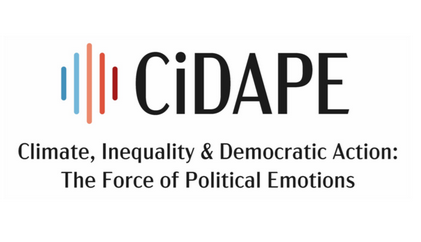CIDAPE
CIDAPE redefines citizen engagement as more than just a tool; it’s a dynamic process that strengthens democracy. This international project brings together 11 partners from nine European countries, all dedicated to exploring the impact of our emotions on democratic politics. The Goal ist to seek ways to establish a more engaged citizenry.

CIDAPE
Climate, Inequality and Democratic Action: The Force of Political Emotions
About the project
In the face of the climate crisis, our feelings and perceptions of inequality play a pivotal role in shaping our decisions. CIDAPE aims to equip policymakers with the tools needed to consider emotions, particularly those related to inequality, when crafting climate policies and communicating them to the public. It underscores the importance of understanding how political emotions frame both online and offline political discourse.
But CIDAPE doesn’t stop there. It also equips civil society stakeholders with a holistic and comprehensive understanding of climate and inequality issues, empowering them to design more effective discussions and engagement formats. Over four years, the project will dive deep into how our emotions influence our political choices, examining everything from news stories, policy documents to social movements.
The ultimate goal is to enhance democracy by considering how people’s feelings about climate change influence their perceptions of inequality. Moreover, CIDAPE develops citizen engagement strategies that incorporate deliberation, participation, and mutual respect. In an era of political disenchantment and polarisation, this approach is crucial for fostering effective citizen engagement at the EU level.
Methodologies
CIDAPE is also pioneering methods to observe and use emotions effectively. It delves into how emotions influence political communication and policy perception, offering valuable insights for political institutions and civil society stakeholders. By identifying emotional dynamics in texts, it provides an emotion-sensitive skill set to bridge the gap between government action and citizen needs, fostering innovative policymaking alongside citizens.
Our part in the project
Over a period of four months, we will conduct 30 interviews and focus groups with people from different professional groups. The focus will be on how our interviewees deal with environmental change in their everyday lives, what they think about how society deals with it and how they assess climate policy and climate activism. These findings should help us to better understand how society deals with environmental phenomena and what role emotions play in this. The scientific basis for this are theories and methods from the sociology of emotions.
Output
The University of Vienna has formulated a total of 8 work packages with numerous goals and milestones. All information can be found on the CIDAPE project homepage: www.cidape.eu/research/.
We will keep you informed about the progress of our project section here on our homepage!



